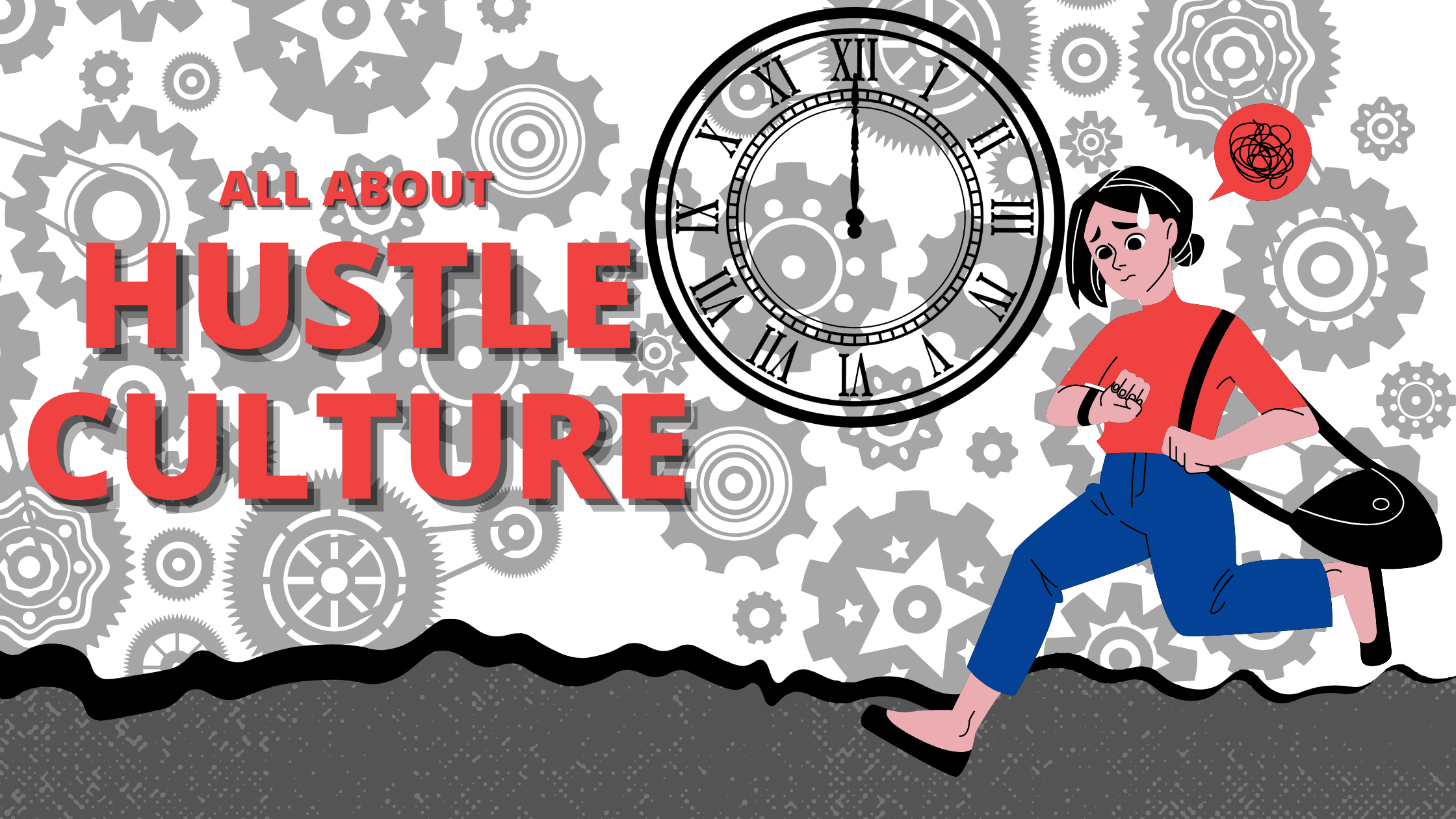
Having exploded into popular vocabulary in recent times, the appeal of hustle culture has seemed to garner almost a cult following since its inception online. The idea that hard work would equate to boundless success is very appealing to many, not to mention a great way to instil a good work ethic in people.
However, hustle culture is not so cut and dry. While it may seem like an innocuous way to promote a hardworking mindset, the perils of hustle culture very much exist beneath its shiny veneer.
Through this article, we hope to explore the many facets of hustle culture and the profound impact this trend has had on our society as a whole.
So… just what is hustle culture? According to many blogs and personal recounts of influencers on social media sites like TikTok, the essence of hustle culture can very simply be boiled down to well… overworking.
Hustle culture places a lot of emphasis on high productivity, normalising the attitude of working long hours, and even perhaps taking on a side gig to “make it” in this unforgiving economic climate. Even students are starting to feel the pinch, between the pressure of keeping grades up, excelling in extracurriculars and maintaining a full social calendar.
While hard work, especially when first entering the workforce, is something that many are prepared to face, the idea that working harder, faster and longer is becoming the norm can pose serious concerns for mental and physical well-being. Hustle culture focuses a lot on tying self-worth to one idea of success— productivity and high earning potential.
For students, hustle culture might manifest in working the hardest to get the best grades, but are grades the only definition of success as a student?
For some, that might be the end goal in life, and there is nothing wrong with that! But to highlight that as the only, or most important definition of success might be discouraging to others with different life goals.
Just what is the allure of hustle culture?
One of the main selling points of hustle culture on social media is the emphasis on success stories. Even early on in the exposure to hustle culture, netizens are bombarded by the alluring lifestyles of those who have it all.
Big houses, fast cars and all the luxury goods they could want. The more discerning viewer would ask— so what’s the catch?
Enter— hustle culture. To live the life and “have it all”, is a very simple trade-off. Work hard now, and reap the benefits later. Entranced by the seemingly simple promise, it is a slippery slope from here on out.
Hustle culture focuses on doing the most, in the shortest amount of time. Things like mental and physical health take the back seat when you are focused on making the most money in the shortest amount of time.
Do you have a free evening? Instead of taking some time off to spend time with family and friends, why not do something more productive? Clock in some extra hours of overtime, or pick up a new skill or side gig.

The pitfalls of perils of the “rise-and-grind”
Admittedly, most of us have adopted this lifestyle at one time or another. Maybe it was in university, hustling through an internship, coursework and perhaps a part-time job on the side.
But most of us know that this sort of lifestyle is unsustainable and usually born out of necessity. We do what we must so we can stop hustling, slow down and live a more balanced lifestyle.
The issue arises when hustling stops becoming a temporary stopgap during a difficult period, but a general outlook on life.
Life is very much a marathon and not a sprint. With hustle culture, you put 100% of your energy into your work and material success, leaving very little room for much else.
We only have a finite amount of energy and hours in a day, and with everything poured into work, hustlers tend to neglect the other things in life that are equally important, like relationships, and mental and physical health.
While living a comfortable life is usually at the top of the list of priorities for people, it is important to remain mindful of the other things in life that hold equal importance.
For example, the relationships you maintain with family and friends so that you have loved ones who can share in your successes and celebrate your wins with you. Nourishing the bonds that you have with your loved ones ensures that not only will you have supportive people in your life who will cheer you on when you chase your dreams, but also help pick you up if you fall.
One of the most important priorities that should never be neglected is mental and physical health. After all, what is the use of all the money and success if you are not in good shape to enjoy it? That is why it is important to take time off to recharge and periodically reassess your goals.
As we age and experience more in life, our goals and priorities might change. It is good to take all this in stride and adjust your lifestyle to your changing needs.
On top of that, we only have one body. Working long hours in the office and at a side hustle can cause unnecessary strain on the body. Some hustlers sacrifice sleep and proper nutrition to work more hours, which can lead to many negative impacts in the long run.
Adequate sleep allows your body to recharge itself, which is important to sustain longer than average work weeks.
Proper nutrition can keep up energy levels and brain function, keeping you in tip-top shape for your work endeavours.

Re-imagining success
If you have made it this far into the article and you are still considering if hustle culture is for you, I would like you to do one thing. I humbly invite you to challenge the traditional notion of constant hustle.
Is this the only path to achievement and success as you know it? Can you afford to explore alternative definitions of success that prioritize holistic well-being, personal growth, and fulfilment?
In this capitalist society, many of us have been conditioned to only accept one definition of success and positive self-worth. Productivity, and the accumulation of material goods.
Should you find yourself questioning if this makes you happy, perhaps it might be worth reflecting on what would really satisfy you.
Perhaps it is building a family, or enriching your community and providing a helping hand to those who need it.
A good way to explore a new definition of success would be to try something new. If helping others is something that has interested you, consider joining the team of tutors here at SmileTutor, and provide a helping hand to kids who might just need a little a little extra push to excel in their studies.
Being able to tutor on the side is also a much more relaxed way to have a side gig while maintaining balance, as you are in charge of your own schedule.

In conclusion, while hustle culture may offer an enticing path to success, it’s crucial to acknowledge the potential pitfalls that accompany this relentless pursuit of goals. Reimagining success beyond the traditional narrative of continuous hustle is a key step. Success should be viewed not just as a professional achievement but as a multifaceted concept that encompasses personal growth, fulfilment, and a healthy work-life balance. By challenging the norms of hustle culture and promoting a more balanced perspective, we can create a culture that fosters long-term success without sacrificing the very essence of a meaningful and fulfilling life. Ultimately, it’s not about working harder, but smarter, and finding harmony in the pursuit of our aspirations.
